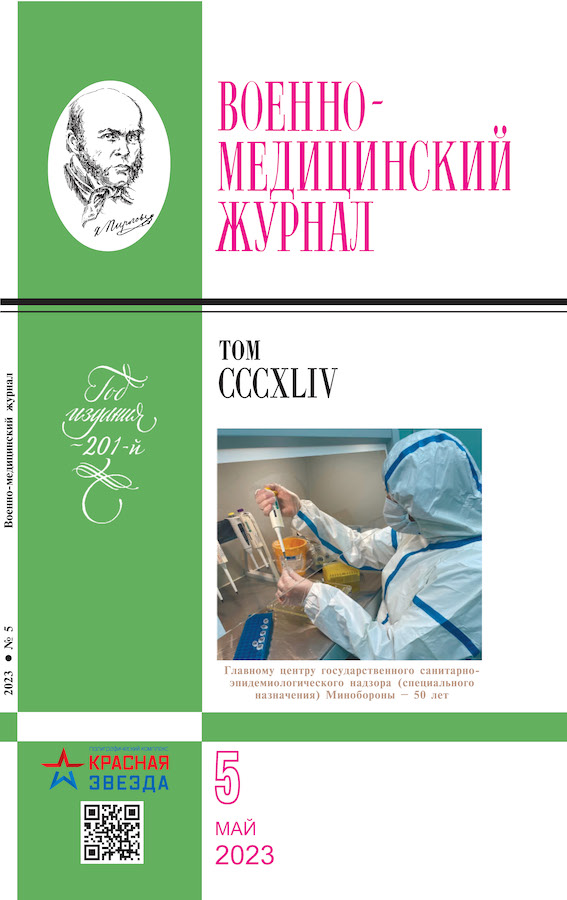Transcranial magnetotherapy in the complex treatment of post-covid asthenic syndrome in military personnel
- 作者: Kuvshinov K.E.1, Klipak V.M.1, Kostycheva T.V.1, Fadeev A.S.1, Yakubova N.K.1
-
隶属关系:
- 9th Medical and Diagnostic Center, of the Ministry of Defense of the Russian Federation
- 期: 卷 344, 编号 5 (2023)
- 页面: 78-80
- 栏目: Brief articles
- URL: https://journals.eco-vector.com/0026-9050/article/view/630069
- DOI: https://doi.org/10.52424/00269050_2023_344_5_78
- ID: 630069
如何引用文章
详细
The clinical efficacy of dynamic transcranial magnetic therapy in the complex treatment of post-covid asthenic syndrome in military personnel was evaluated. 2 groups were formed: complex treatment (medication + dynamic transcranial magnetotherapy, n=17) and control (medication, n=38). The procedures were carried out on the apparatus AMO-ATOS with the prefix «Headband». The connection of magneto-therapy to the medical treatment of post-covid asthenic syndrome allows an earlier time (by the end of the 2nd–3rd week of treatment, 1–2 weeks earlier than in the control group) to lead to a subjective improvement in well-being, a decrease in anxiety, an increase in concentration and workability.
作者简介
K. Kuvshinov
9th Medical and Diagnostic Center, of the Ministry of Defense of the Russian Federation
Email: vklipak@ya.ru
俄罗斯联邦, Moscow
V. Klipak
9th Medical and Diagnostic Center, of the Ministry of Defense of the Russian Federation
编辑信件的主要联系方式.
Email: vklipak@ya.ru
俄罗斯联邦, Moscow
T. Kostycheva
9th Medical and Diagnostic Center, of the Ministry of Defense of the Russian Federation
Email: ktv-cardio@mail.ru
俄罗斯联邦, Moscow
A. Fadeev
9th Medical and Diagnostic Center, of the Ministry of Defense of the Russian Federation
Email: vklipak@ya.ru
俄罗斯联邦, Moscow
N. Yakubova
9th Medical and Diagnostic Center, of the Ministry of Defense of the Russian Federation
Email: vklipak@ya.ru
俄罗斯联邦, Moscow
参考
- Зайцев А.А., Савушкина О.И., Черняк А.В., Кулагина И.Ц., Крюков Е.В. Клинико-функциональная характеристика пациентов, перенесших новую коронавирусную инфекцию COVID-19 // Практич. пульмонол. – 2020. – № 1. – С. 78–81.
- Мареев О.В., Райгородский Ю.М., Шкрабов В.В. Транскраниальная магнитотерапия в лечении острой нейросенсорной тугоухости сосудистого генеза // Вестн. оториноларингологии. – 2006.– № 1. – С. 57–58.
- Орехова Э.М., Свистунов А.А., Кончугова Т.В. и др. Эффективность динамической магнитотерапии в комплексном лечении когнитивных нарушений у больных с хронической цереброваскулярной недостаточностью // Журн. неврологии и психиатрии. – 2009. – № 2. – С 59–60.
- Петрова Н.Н., Кудряшов А.В., Матвиевская О.В. и др. Депрессивные состояния в структуре постковидного синндрома: особенности и терапия // Обозрение психиатрии и медицинской психологии им. В.М.Бехтерева. – 2021. – Т. 56, № 1. – С. 16–24.
- Стандарт диагностики и лечения новой коронавирусной инфекции (COVID-19) у военнослужащих Вооруженных Сил Российской Федерации: Метод. рекоменд. – М., 2021. – 64 с.
- Улащик В.С. Теоретические и практические аспекты общей магнитотерапии // Вопр. курортол. – 2001. – № 5. – С. 3–7.
- Федеральная служба по надзору в сфере защиты прав потребителей и благополучия человека. «20 вопросов о «постковидном синдроме». – М., 2022. URL: https://77.ros potrebnadzor.ru...postkovidnom-sindrome...… 2022 (дата обращения: 15.03.2023).
补充文件






